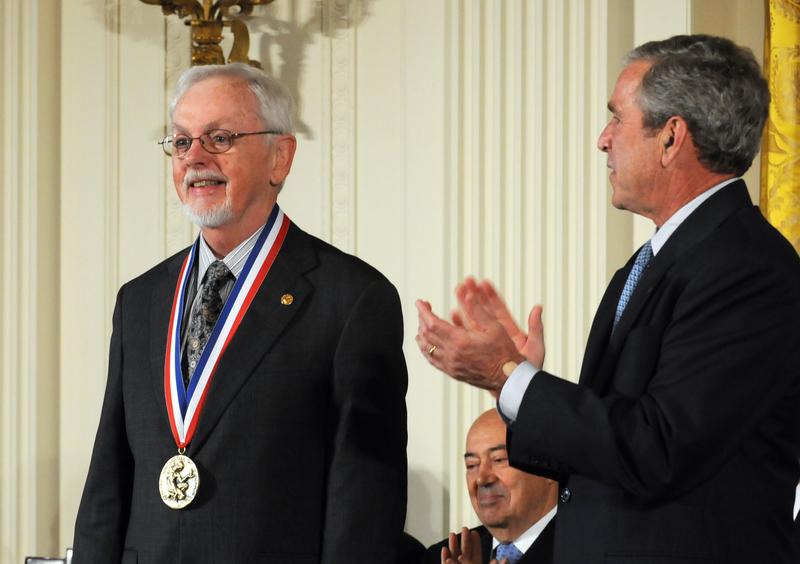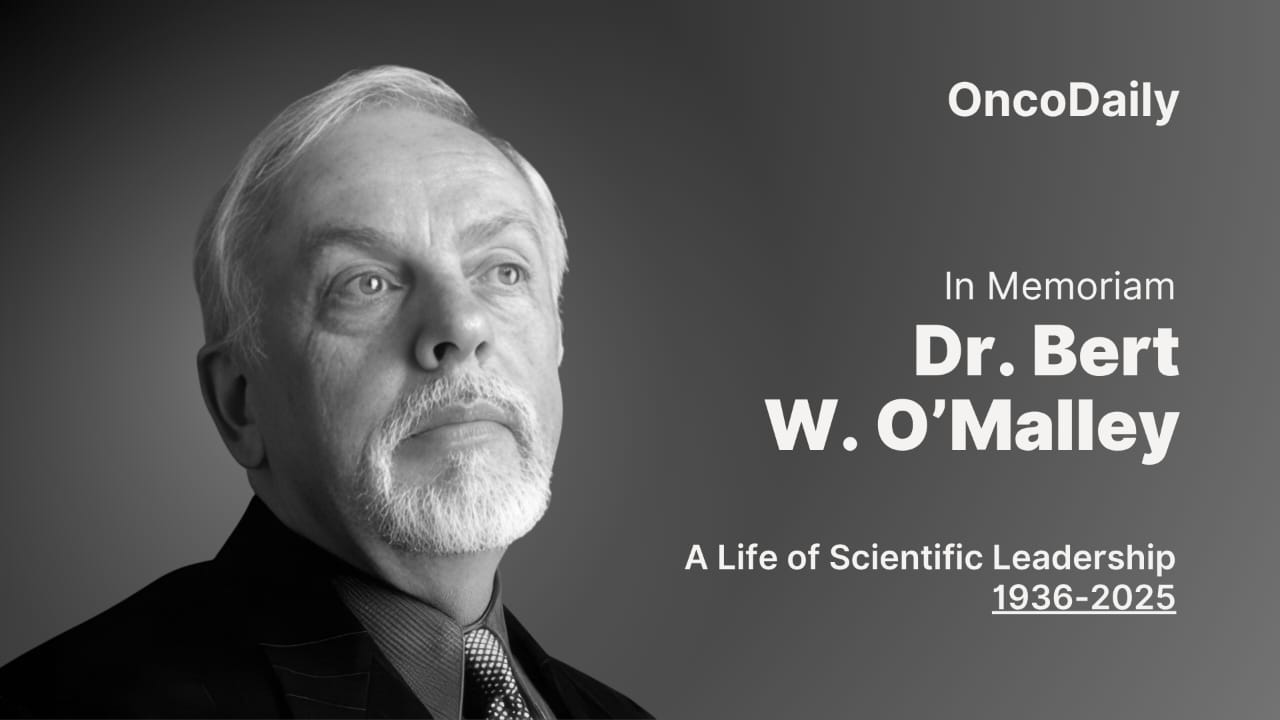Bert W. O’Malley (December 9, 1936 – November 11, 2025) was a pioneering endocrinologist widely regarded as the Father of Molecular Endocrinology. Over his distinguished career, he made key discoveries demonstrating how intracellular steroid hormones act on DNA to regulate gene expression, clarifying hormone action mechanisms at the molecular level. He discovered and cloned nuclear receptor coactivators, crucial regulators of gene transcription, and revealed their roles in physiology and diseases including cancer. Holding leadership roles at Baylor College of Medicine, including Chair of Molecular and Cellular Biology and Chancellor, O’Malley was a mentor to hundreds of scientists and earned numerous awards, including the National Medal of Science.

2007 National Medal of Science
Early Life and Education of Bert W. O’Malley
Bert W. O’Malley was born in 1936 in the Garfield section of Pittsburgh, Pennsylvania. He received his early education at Catholic primary schools and Central Catholic High School. He pursued higher education at the University of Pittsburgh, where he completed both his undergraduate and medical degrees, graduating first in his class. After medical school, he completed his residency training in Internal Medicine at Duke University, followed by advanced clinical endocrine and research training at the National Cancer Institute (NIH-NCI).
During his early research, O’Malley used the chick oviduct as a model to study how female sex steroids induce the synthesis of specific proteins, which significantly advanced the understanding of hormone regulation in endocrine organs. This foundational work set the stage for his groundbreaking discoveries in molecular endocrinology throughout his career.
O’Malley’s academic path subsequently led him to Vanderbilt University and later Baylor College of Medicine, where he developed his seminal contributions to how hormones act on DNA to regulate gene expression.
Scientific Career and Landmark Discoveries of Bert W. O’Malley
Bert W. O’Malley’s scientific career was marked by groundbreaking discoveries that transformed the field of molecular endocrinology. In 1972, he was the first to demonstrate that hormones directly act on DNA to regulate gene expression by inducing specific mRNAs, clarifying hormone action mechanisms at the molecular level.
A landmark breakthrough in his career was the discovery of nuclear receptor coactivators, proteins essential for facilitating receptor-dependent gene transcription. In 1995, O’Malley successfully cloned the first coactivator, SRC-1, revealing critical components necessary for transcriptional regulation by steroid nuclear receptors. His work illuminated the role of coactivators in regulating diverse physiological processes including reproduction, metabolism, inflammation, cardiovascular function, and especially cancer.

Photo: Depositphotos
O’Malley’s laboratory published key cryo-EM structures of full-length nuclear receptor-coactivator complexes bound to DNA, advancing the understanding of gene regulation machinery. His research further led to developing coactivator-targeted therapies, particularly innovative cancer treatments. For example, his group showed that modifying the SRC-3 coactivator in immune T-regulatory cells enhanced tumor immune responses, enabling a new form of adoptive cell transfer therapy with curative potential for cancers.
Throughout his career, O’Malley authored over 750 scientific papers and holds more than 30 patents. His discoveries have laid the foundation for many current and future therapeutic strategies in medicine.
Bert W. O’Malley’s Leadership, Academic Roles, and Mentorship
Bert W. O’Malley held several prominent leadership and academic roles throughout his career. At Baylor College of Medicine, he was the Tom Thompson Distinguished Leadership Professor of Molecular and Cellular Biology and served as the Chair of Molecular and Cellular Biology. In July 2018, O’Malley was appointed as the fourth Chancellor of Baylor College of Medicine, marking a distinguished period in medical research leadership and education.
Beyond his administrative roles, O’Malley was a dedicated mentor to hundreds of scientists and researchers. His mentorship fostered a vibrant scientific community, producing numerous successful careers and groundbreaking research in molecular biology and endocrinology. His influence extended internationally through numerous collaborations, editorial board memberships, and active participation in scientific societies. Through his leadership and mentorship, O’Malley shaped the future of molecular endocrinology and cancer research significantly.
Bert W. O’Malley’s Honors, Awards, and Scientific Recognition
Bert W. O’Malley has been elected to the National Academy of Sciences, the National Academy of Medicine, and is a Fellow of the National Academy of Inventors, reflecting his profound impact on biomedical research and innovation. He received the National Medal of Science from the White House in 2008 and has earned more than 65 major national and international honors across endocrinology, molecular biology, and medical science. Among these are the Steven C. Beering Award (Indiana University School of Medicine, 2009) and recognitions from the AACR, Endocrine Society, and Society for the Study of Reproduction for his foundational work in hormone action and nuclear receptor coactivators.
O’Malley holds over 30 patents (reported as 29–33 in institutional sources) spanning gene regulation, nuclear receptor coactivators, and molecular or cell-based therapies. These include small-molecule modulators of steroid receptor coactivators and coactivator-centric adoptive cell transfer approaches under clinical development pathways such as CoRegen-BCM. Public records also show multiple filings related to coactivator-targeted therapeutics and diagnostics.
Often referred to as the “Father of Molecular Endocrinology,” O’Malley has mentored more than 220 scientists and authored over 700 scientific publications, underscoring his enduring global influence in endocrine and oncologic research.
Statement of Condolence from the OncoDaily Editorial Team
The OncoDaily Editorial Team extends its deepest condolences on the passing of Dr. Bert W. O’Malley, a visionary scientist whose groundbreaking discoveries transformed the fields of endocrinology and molecular biology.
Dr. O’Malley’s pioneering work on nuclear receptor coactivators laid the foundation for much of modern molecular medicine and oncology. His legacy lives on through the generations of scientists he mentored, the institutions he helped shape, and the countless patients whose lives have been improved through the advances his research made possible.
We honor his extraordinary contributions to science, education, and humanity, and express our heartfelt sympathy to his family, colleagues, and the global scientific community mourning this immense loss.
Written by Aharon Tsaturyan, MD, Editor at OncoDaily Intelligence Unit


